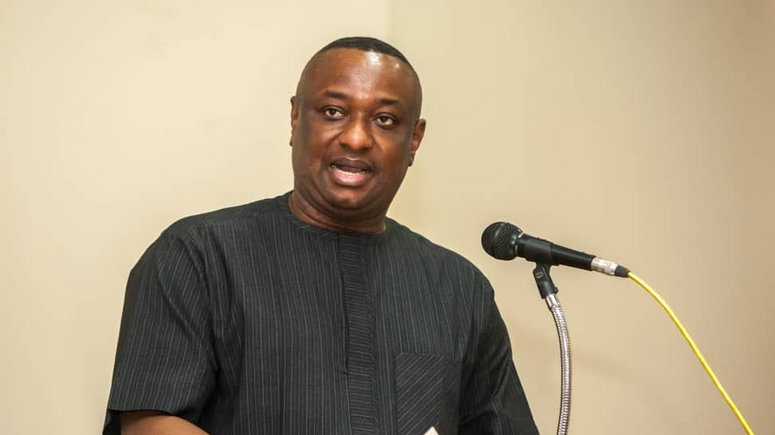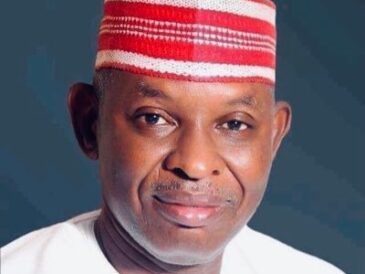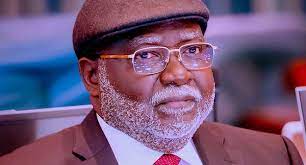- Pix above(l-r): Sen President Godwill Akpabio and Reps Speaker Tajudeen Abbas
SHARE THIS
The Socio-economic Rights and Accountability project (SERAP) has insisted that social media is not Nigeria’s problem as National Broadcasting Commission (NBC) would want the world to believe.
The NBC had newly reintroduced Social Media Regulation Bill to the National Assembly in attempt to gag the industry, as it said it is just a monster for Nigeria and nothing more.
But rejecting the new Bill through a formal protest written to both leaders of Nigerian Senate and House of Representatives, Senate President Godswill Akpabio and Reps Speaker Tajudeen Abbas,and copied to President Bola Tinubu, at the weekend, SERAP, through its Deputy Director, Kolawole Oluwadare, in a letter titled : “Request to reject the newly reintroduced social media regulation bill,” insists that Nigeria, as a nation, has more problems than social media, as NBC was trying to tell the world.
SERAP said the Bill, if passed, would unduly restrict the rights to freedom of opinion and expression and privacy by criminalizing legitimate and lawful exercise of these rights.
It began:
“H.E. Chief Godswill Obot-Akpabio, CON
Senate President
National Assembly
Three Arms Zone, Abuja
Abuja
Mr Tajudeen Abbas
Speaker of House of Representatives
National Assembly
Three Arms Zone, Abuja
Abuja.
Email: info@nass.gov.ng
“Dear Chief Godswill Obot-Akpabio, and Mr Tajudeen Abbas:
Re: Request to reject the newly reintroduced social media regulation bill which
if passed would unduly restrict the rights to freedom of opinion and expression and privacy by criminalizing legitimate and lawful exercise of these rights Socio-Economic Rights and Accountability Project (SERAP) is writing to request you to use your good offices and leadership positions to reject the newly reintroduced social media regulation bill which if passed would unduly restrict the rights to freedom of opinion and expression and privacy by criminalizing legitimate and lawful exercise of these rights.
“SERAP urges you to request the administration of President Bola Tinubu to immediately drop any ongoing efforts to put pressure on Google, YouTube, TikTok
and other social media companies to unduly restrict the rights to freedom of
expression and privacy.
“SERAP urges you to request the administration of President Bola Tinubu to publish the details of any ongoing discussion and engagement with Google, YouTube, TikTok and other social media companies.
“Our requests are brought in the public interest, and in keeping with the requirements of the Nigerian Constitution 1999 [as amended], and the country’s
international obligations including under the African Charter on Human and Peoples’ Rights and the International Covenant on Civil and Political Rights to which Nigeria is a state party.
“SERAP is a non-profit, nonpartisan, legal and advocacy organization devoted
to promoting transparency, accountability and respect for socio-economic rights in
Nigeria. SERAP received the Wole Soyinka Anti-Corruption Defender Award in 2014, and was nominated for the UN Civil Society Award and Ford Foundation’s Jubilee Transparency Award. SERAP is a member of the UNCAC Coalition, a global anti-corruption network of over 350 civil society organizations (CSOs) in over 100
countries, which is committed to promoting the ratification, implementation and
monitoring of the UN Convention against Corruption. SERAP previously served as
one of two Sub-Saharan African civil society representatives on the governing Committee of the Coalition.
“According to our information, Director-General of the National Broadcasting Commission (NBC), Balarabe Ilelah, this week stated that the social media regulation bill has been sent to the National Assembly. The bill is reportedly seeking to repeal and reenact the NBC Act, CAP L11 Laws of the Federation of Nigeria 2004.
According to the NBC, “We have already submitted a bill to amend the NBC act.
“One of our major problems now is social media. Unless there is a law that allows
NBC to act on social media issues, the issue will continue to be a monster in our
daily lives in this country.”
“Similarly, Mrs. Francisca Aiyetan, Director, Broadcast Monitoring of the NBC,
also reportedly said that without regulation, young people could be misguided.
According to the NBC, the Federal Government is currently engaging with Google or YouTube, TikTok, “so we know the faces behind these [social media] platforms.”
“According to our information, the newly reintroduced social media regulation
bill seems to be the replica of the version of the Protection from Internet Falsehood and Manipulation Bill 2019, with provisions empowering the authorities to unilaterally order the shutdown of the internet. A similar bill regulate social media was considered by the National Assembly in 2015 but failed to pass into law after public outcry.
“The proposed bill raises serious concerns about the rights to freedom of
expression and privacy. If the 2023 social media regulation bill which has reportedly passed the first reading before the National Assembly is the same as the 2019 bill, it would impose disproportionate penalties on Nigerians solely for peacefully exercising their human rights and lead to digital siege.
“Any move to regulate social media would be inconsistent and incompatible
with the provisions of the Nigerian Constitution 1999 [as amended] and the country’s international human rights obligations. Contrary to the position by the Federal Government, the social media is neither Nigeria’s problem nor a monster. Restriction on access to the social media would have arbitrary and excessive effects and cause incalculable damage, both in material and human rights terms.
“Imposing restrictions on social media would offend the right to freedom of
expression and privacy. It would deprive millions of Nigerians of their only means of reaching loved ones, continuing their legitimate work or participating in political debates or decisions.
“The reintroduction of the social media regulation bill would lead to
deterioration of the human rights situation in the country and carry major economic costs for all sectors, as well as exacerbate social and economic inequalities. It would effectively deepen digital divides in the country and seriously undermine the administration’s expressed commitment in this sector.
“Under international law, all restrictions on the operation of social media
companies and other intermediaries must comply with the requirements of legality, legitimacy and necessity. The regulation of social media may be incompatible with the services of some of the major social media and private messaging intermediaries, negatively impacting the free flow of information and ideas, and access to information, and affecting economic and social activities.
“Rather than rushing to pass the social media regulation bill, the National
Assembly should encourage the Federal Government to maximize opportunities
around social media access, which is essential for the realization of many other
human rights.
“The National Assembly should put pressure on the Federal Government to
comply with the requirements of the Nigerian Constitution 1999 [as amended] and the country’s international human rights obligations regarding the rights to freedom of expression, privacy and participation.
Access to social media is widely recognized as an indispensable enabler of a
broadrange of human rights. It is for freedom of expression and central to the
realization of the other human rights including education, freedom of association and assembly, access to information, and participation.
The Federal Government has the legal obligations to promote and facilitate
the enjoyment of human rights, and to take all steps necessary to ensure that all
individuals have meaningful access to social media. The authorities therefore should refrain from unduly interfering with access to the Internet and digital communications platforms.
“Under Section 39 of the Nigerian Constitution, Article 19 of the International
Covenant on Civil and Political Rights and Article 9 of the African Charter on Human and Peoples’ Rights, any restriction on freedom of expression constitutes a serious curtailment of human rights.
The Nigerian Constitution and these human rights treaties protect everyone’s
right to freedom of expression, which includes the freedom to seek, receive and
impart information of all kinds, regardless of frontiers. States have the obligation to respect and ensure the right to freedom of expression, without distinction of any kind.
“The Nigerian Constitution and human rights treaties protect a broad range of
expression, including political discourse, commentary on one’s own and public
affairs, canvassing, discussion of human rights, journalism, and artistic expression.
This includes information that may be regarded as offensive, false or untrue by some people but is considered legitimate political discourse by others.
Restrictions on the right to freedom of expression are only permissible when
they meet the requirements of legality, necessity, proportionality and non-
discrimination. The onus to show that restrictions comply with those conditions is on the State seeking to restrict rights. Social media regulation bills generally do not meet those requirements.
“The African Commission on Human and Peoples’ Rights has called upon
States not to engage in or condone any restriction of access to the Internet or other digital technologies for segments of the public or an entire population.
The Sustainable Development Goals reinforce States’ human rights obligations to work towards universally available and accessible Internet, free from unjustified restrictions. In target 9.c of the Goals, States committed to significantly increasing access to information and communications technology and striving to provide universal and affordable access to social media. In target 5.b of the Goals, States also pledged to enhance the use of enabling technology, in particular information and communications technology, to promote the empowerment of women.
“We would be grateful if the recommended measures are immediately taken
upon the receipt and/or publication of this letter. SERAP shall take all appropriate
legal actions against the National Assembly and the Federal Government if the
social media regulation bill is ever passed into law.
Please accept the expression of our highest consideration. Thanking you in
advance of your urgent attention to the matter./SHARE THIS
Yours sincerely,
Kolawole Oluwadare
Deputy Director
CC
His Excellency
Bola Tinubu, GCFR
President, Federal Republic of Nigeria
Aso Rock Presidential Villa
Abuja.





